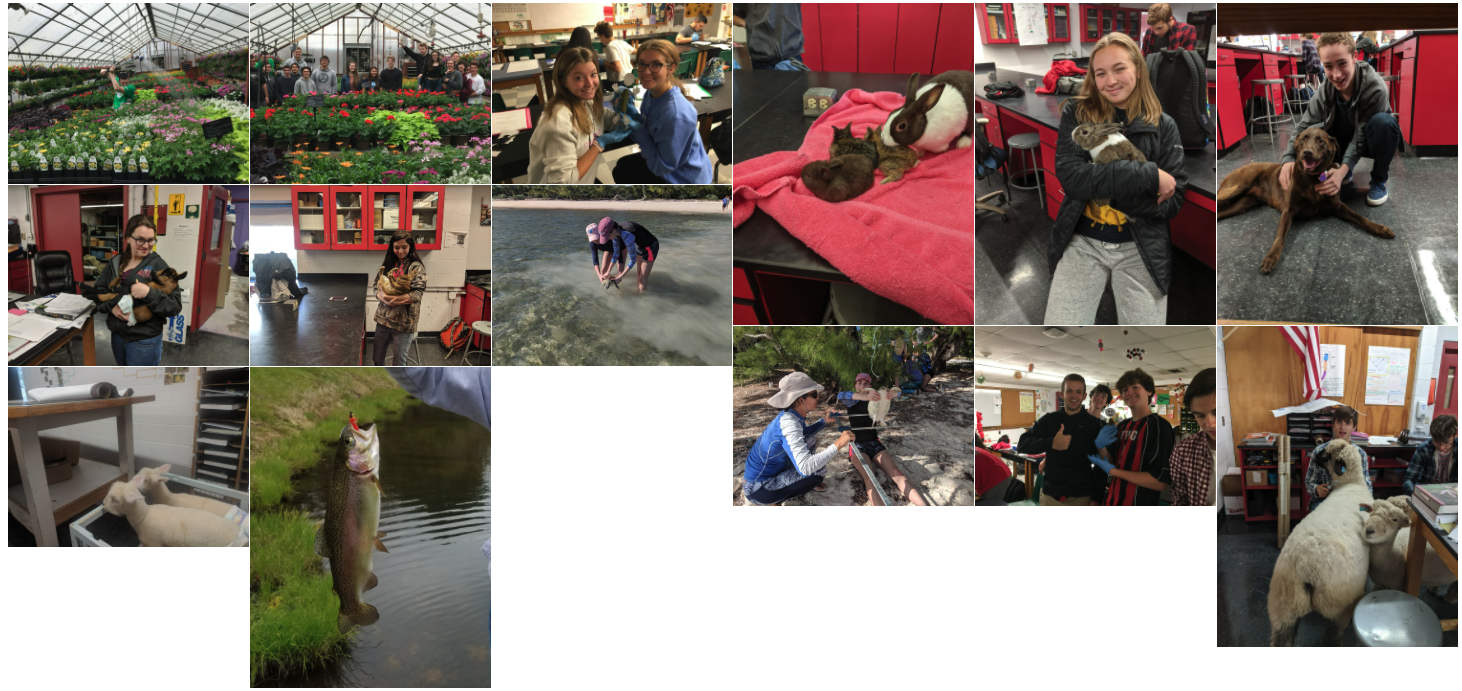AGRICULTURAL SCIENCE
Agricultural Science is a multidisciplinary field of Biology that includes the fields that are used in the practice of agriculture. The EWG Agricultural Science program strives to give students an exploration of those disciplines. The pathway allows students to learn a rigorous curriculum with hands-on learning; fostering teamwork, leadership, a solid fundamental understanding of Agricultural Science, and teach them the skills they will need to be successful in the future, be it in the workplace or in a college program.
The pathway meets the needs of individual students while encouraging all students to meet higher expectations. During freshman year, students will explore agricultural careers and be introduced to the supervised agricultural experience. As students continue in the program, students can choose from a variety of electives, such as Wildlife Management, Horticulture, Animal Science, and Biotechnology.
ANIMAL SCIENCE
Topics include the animal industry’s role in the world and national economy; inheritance, reproduction, growth, physiology, nutrition, and diseases of domestic animals and poultry; geographic distribution and marketing of animal products. Students will use basic knowledge of biological science concepts and investigate best management practices as they care for a classroom lab animal. Students will identify a question concerning animal care and management and then design and carry out a research project using the scientific method to answer their question. Ten weeks of rabbit management in the classroom is required.
BIOTECHNOLOGY
The Biotechnology program helps students explore Biotechnology in a myriad of ways. Students develop lab skills around the use of serological pipets and autopipeting, micropipetting, mass balances and pH. Students learn about solution and media preparation, spectrophotometry and laminar flow hoods for plant tissue culture (cloning). Biotechnology students have the opportunity to investigate Forensic Biotech by performing polymerase chain reaction (PCR) using gel electrophoresis. They also explore Genetic Engineering, Biomanufacturing, and develop microbiology skills.
HORTICULTURAL SCIENCE
The EWG horticulture course teaches students to manage the school’s greenhouse. Students apply the information they learn in the classroom to real-world hands-on plant production. The plants are then sold at the end of the year at the EWG Greenhouse plant sales. In addition, the horticulture class offers a lot of Project-Based Learning opportunities, which allows students to learn by actively engaging in real-world projects. Students pick an area of interest and with engaging essential questions, students come up with real-world solutions to agricultural/environmental issues surrounding the world today. Exeter West Greenwich is a smaller school, which really creates a community atmosphere. The Horticultural science class is designed to give students a look into the exciting world of plants. Topics discussed include ethics, ecology, compost and vermicompost, anatomy and reproduction of plants, Integrated Pest Management, Seed anatomy and propagation, plant cells and genetics, photosynthesis, tissue culture, agronomy, and health. Emphasis will be placed on hands-on learning involving greenhouse crop management, propagation, PBL, Landscape design, and bedding plant production. The EWG agricultural pathway really fosters student leadership through mentoring and really enhances good relationships amongst students to students and students to teachers.
WILDLIFE MANAGEMENT
Wildlife Management or Natural Resource Management is a course designed for students with an interest in careers in wildlife management, fishery management, environmental science, forestry, wetland conservation, ecology, soil, and water resource management, and land use planning. Students will study four broad topics; Ecology, Forestry, Land Use, and Wildlife/Natural Resource Management. Students will explore a variety of ecosystems/habitats and the organisms that live there, evaluate environmental management problems, and examine alternative solutions for resolving and/or preventing them. They will also get an introduction to GIS, Geographic Information Systems, one form of geospatial technology that, over the last few decades, has risen to the forefront of tools needed for a successful career in natural resources management and many environmentally based fields. In addition to traditional classroom work, students will be learning through research, fieldwork, experimentation, and data analysis. We have partnered for many years with RIDEM to bring in programs exploring the conservation and management of our local rivers, watersheds, population ecology, and forest/land use management and planning. We are an active participant in Salmon in the Classroom, a federally funded program sponsored by RIDEM to help restore Atlantic Salmon to their native waters.

